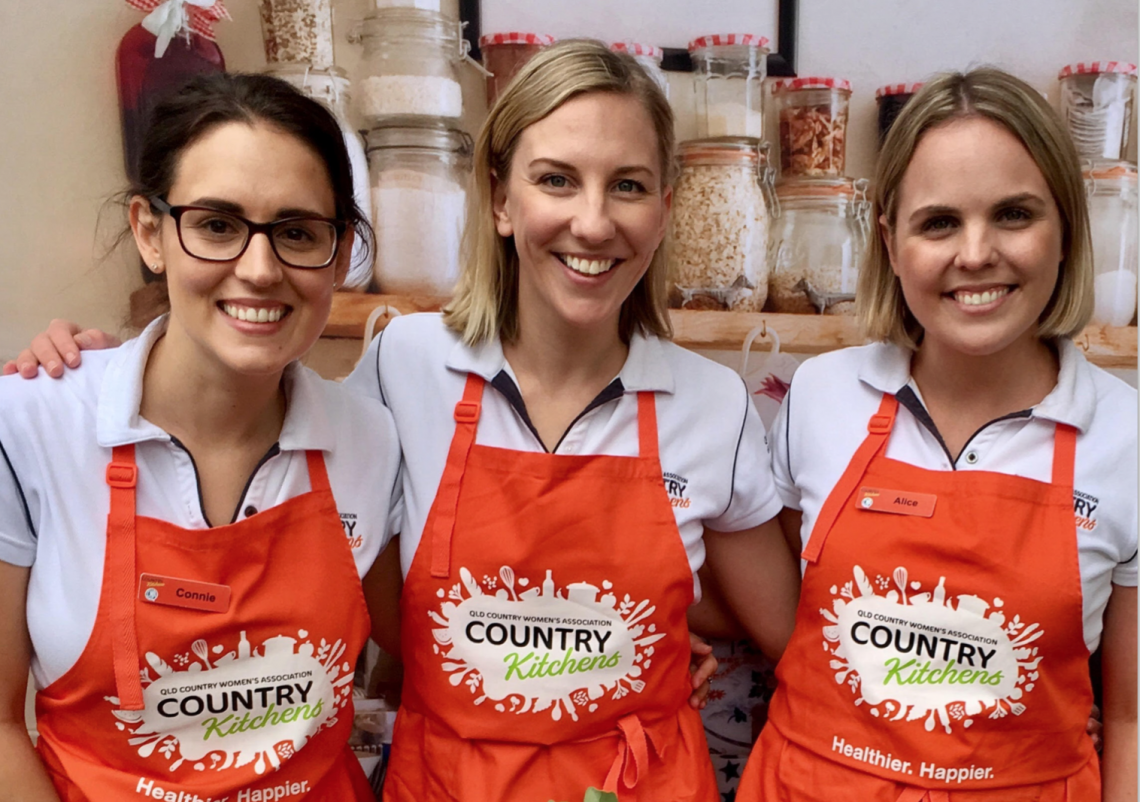For our Aussie readers, the phrase “Queensland Country Women’s Association” (QCWA) evokes images of a delectable “cookery book”, first published in 1959, filled with classic recipes that were then handed down through generations.
On the foundation of that positive association, in 2015 QCWA launched a program called Country Kitchens “to support people living in regional, rural and remote Queensland to improve their health by adopting healthier eating practices”. Through the program, Facilitators – including APDs –delivered in-person nutrition and cooking events statewide.
Program coordinator Fiona MacKenzie spoke with us recently about the impact of Country Kitchens, sharing lessons applicable for all dietitians who work in the community to positively impact behaviours.
“The QCWA has a long history as a strong and passionate volunteer workforce.”
What are you most proud of from the Country Kitchens program’s work?
The program provided a platform for passionate, community-minded and driven women to support healthy behaviours in their communities. We trained and supported over 150 QCWA Branch Members to become Country Kitchens Facilitators. They, in turn,
brought the program to their community through showcases, Hands on Nutrition Workshops and community activities. These women have been an inspiration.
What was your biggest challenge – and how did you overcome it?
The QCWA has a long history as a strong and passionate volunteer workforce. The organisation has a community service focus, is renowned for its members’ cooking skills and has statewide infrastructure to support health promotion on the ground. The greatest challenge has been to mobilise the organisation to view these attributes and strengths as capacity to be an agent for health promotion in the local community. The program team built a strong working relationship with the Association, which enabled the program to be developed through a co-design process and implemented collaboratively, supporting the mobilisation of their capacity.
What has the response been from the community?
Well received, by the 80 communities that engaged in the Hands on Nutrition Workshops! Like many of the QCWA Branches engaged in the program, the QCWA Charleville Branch leveraged the program to build partnerships with community stakeholders. These provided a platform for the Charleville Facilitator to implement a number of cooking and nutrition promotion workshops with local schools, the school of distance education and within surrounding communities.
How can dietitians get involved in supporting the program?
Purchase your copy of the ‘In My Country Kitchen’ cookbook – in hardcopy or eBook. The Cookbook celebrates the very best local produce Queensland has to offer in recipes contributed by QCWA members from across the state. All profits support QCWA to continue to run community activities in their local area. Also, get in touch with your local QCWA branch; they may be running local community health promotion activities and could use your support in promotion, or share your expertise at their community events. Visit the QCWA website to find your local branch.
What’s ahead for Country Kitchens?
Our fabulous Country Kitchens Facilitators will be continuing to support and promote healthy behaviours in their local communities. These activities range from healthy catering, showcasing and cooking demonstrations at local shows, organising and coordinating health awareness days, and hands-on nutrition workshops.
An Extraordinary Experience for Dietitians
Fiona highlighted the diversity of the skill set required for dietitians involved in the Country Kitchens program. Its dietitian facilitators worked with over 80 local communities to plan, develop/design and implement nutrition promotion initiatives – all, while travelling to regional, rural and (sometimes very) remote communities.
“We have created a unique nutrition criteria we use to assess every recipe, and taught our facilitators how to modify recipes to ensure they are healthier,” noted Fiona. “This has been very successful, and the resultant cookbooks demonstrate this behaviour change.”
The program has also developed many skills for the dietitians in the first three years. “Partnering with Monash University to develop and implement a research strategy enabled the team to hone research and publishing skills,” said Fiona, “with all abstracts accepted at the last DAA conference — importantly, skills and knowledge development in community capacity building. This quite abstract term was studied with the team developing readiness scales and markers for each of the eight domains of health promotion capacity as they related to the country kitchens program. This is developing the role of the dietitian into that of community nutritionist or public health nutritionist.”
The second phase of the program will look toward the environmental determinants of health; importantly, better understanding the existing
capacity for health promotion in communities, and then building on that through localised targeted strategies.
